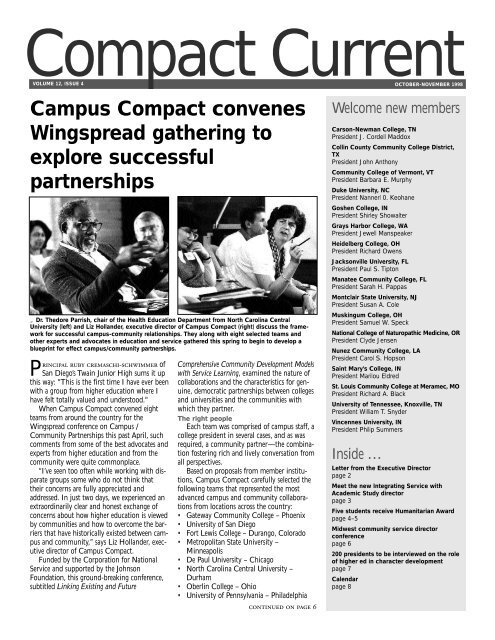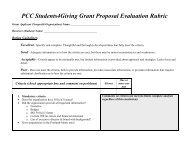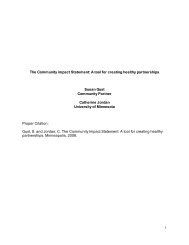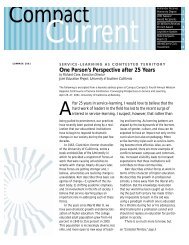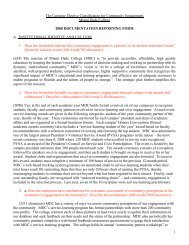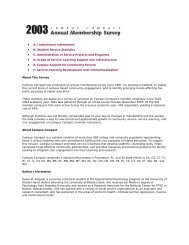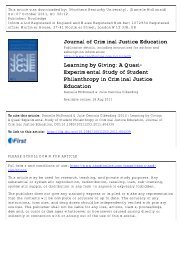Oct-Nov 1998 - Campus Compact
Oct-Nov 1998 - Campus Compact
Oct-Nov 1998 - Campus Compact
Create successful ePaper yourself
Turn your PDF publications into a flip-book with our unique Google optimized e-Paper software.
<strong>Compact</strong> CurrentVOLUME 12, ISSUE 4OCTOBER-NOVEMBER <strong>1998</strong><strong>Campus</strong> <strong>Compact</strong> convenesWingspread gathering toexplore successfulpartnerships„ Dr. Thedore Parrish, chair of the Health Education Department from North Carolina CentralUniversity (left) and Liz Hollander, executive director of <strong>Campus</strong> <strong>Compact</strong> (right) discuss the frameworkfor successful campus-community relationships. They along with eight selected teams andother experts and advocates in education and service gathered this spring to begin to develop ablueprint for effect campus/community partnerships.PRINCIPAL RUBY CREMASCHI-SCHWIMMER ofSan Diego’s Twain Junior High sums it upthis way: "This is the first time I have ever beenwith a group from higher education where Ihave felt totally valued and understood."When <strong>Campus</strong> <strong>Compact</strong> convened eightteams from around the country for theWingspread conference on <strong>Campus</strong> /Community Partnerships this past April, suchcomments from some of the best advocates andexperts from higher education and from thecommunity were quite commonplace.“I’ve seen too often while working with disparategroups some who do not think thattheir concerns are fully appreciated andaddressed. In just two days, we experienced anextraordinarily clear and honest exchange ofconcerns about how higher education is viewedby communities and how to overcome the barriersthat have historically existed between campusand community,” says Liz Hollander, executivedirector of <strong>Campus</strong> <strong>Compact</strong>.Funded by the Corporation for NationalService and supported by the JohnsonFoundation, this ground-breaking conference,subtitled Linking Existing and FutureComprehensive Community Development Modelswith Service Learning, examined the nature ofcollaborations and the characteristics for genuine,democratic partnerships between collegesand universities and the communities withwhich they partner.The right peopleEach team was comprised of campus staff, acollege president in several cases, and as wasrequired, a community partner—the combinationfostering rich and lively conversation fromall perspectives.Based on proposals from member institutions,<strong>Campus</strong> <strong>Compact</strong> carefully selected thefollowing teams that represented the mostadvanced campus and community collaborationsfrom locations across the country:• Gateway Community College – Phoenix• University of San Diego• Fort Lewis College – Durango, Colorado• Metropolitan State University –Minneapolis• De Paul University – Chicago• North Carolina Central University –Durham• Oberlin College – Ohio• University of Pennsylvania – PhiladelphiaCONTINUED ON PAGE 6Welcome new membersCarson-Newman College, TNPresident J. Cordell MaddoxCollin County Community College District,TXPresident John AnthonyCommunity College of Vermont, VTPresident Barbara E. MurphyDuke University, NCPresident Nannerl 0. KeohaneGoshen College, INPresident Shirley ShowalterGrays Harbor College, WAPresident Jewell ManspeakerHeidelberg College, OHPresident Richard OwensJacksonville University, FLPresident Paul S. TiptonManatee Community College, FLPresident Sarah H. PappasMontclair State University, NJPresident Susan A. ColeMuskingum College, OHPresident Samuel W. SpeckNational College of Naturopathic Medicine, ORPresident Clyde JensenNunez Community College, LAPresident Carol S. HopsonSaint Mary’s College, INPresident Marilou EldredSt. Louis Community College at Meramec, MOPresident Richard A. BlackUniversity of Tennessee, Knoxville, TNPresident William T. SnyderVincennes University, INPresident Philip SummersInside …Letter from the Executive Directorpage 2Meet the new Integrating Service withAcademic Study directorpage 3Five students receive Humanitarian Awardpage 4–5Midwest community service directorconferencepage 6200 presidents to be interviewed on the roleof higher ed in character developmentpage 7Calendarpage 8
LETTER FROM THE EXECUTIVE DIRECTORElizabeth L. HollanderCivic Education: Is higher ed losing?IN EARLY JULY, the National Commission onCivic Renewal, co-chaired by WilliamBennett and Sam Nunn, released their finalreport entitled, “A Nation of Spectators.” In itthe Commission made this eloquent statementabout service-learning in secondary schools:“ … we are impressed with the ways in whichwell-designed community work carefully linked toclassroom reflection can enhance the civic educationof students.”—“A Nation of Spectators,” the report of theNational Commission on Civic Renewal, July<strong>1998</strong>.The report calls upon many sectors in societyto revive our civic life: individuals, families,neighborhoods, elementary and secondaryschools, faith-based institutions, and themedia. The Commission also calls upon manyin the academy to inform them about the stateof the democracy, such as Harry Boyte fromthe University of Minnesota, Benjamin Barberfrom Rutgers, Amy Gutman from Princeton,and Jane Mansbridge from Harvard.Noticeably absent from the Commission’sreport, however, was any reference to therole that higher education can and indeeddoes play in civic education.What does this glaring absence mean for us?In this edition of our newsletter alone, we havecompelling evidence of the impact of serviceand service-learning upon civic education.On the institutional front, the WingspreadConference documents the extraordinary workof eight campuses to integrate campusresources effectively on behalf of communitydevelopment.In terms of student impact, the Sweareraward recipients, profiled on pages 4–5, havenot just “helped” people, but in fact foundconcrete ways to build the capacity of minorityor poor populations to have a voice in theirown futures. Other evidence abounds. Ourrecent publication, Service Matters, forinstance, not only documents significantgrowth in student service and service-learningin recent years but also features model programsfrom 400 campuses.So why is it that a distinguished commission,co-chaired by the former Secretary ofEducation and with several academics in itsmembership, does not see higher education asa significant player in civic education? Is itbecause we are not telling our story? Is itbecause we are not succeeding in creating thenext generation of democratic citizens?There is no question that we need to do abetter job in spreading the word about thegood work campuses are doing in educatingstudents about their civic responsibilities andproviding effective resources for communitybuilding. When is the last time you saw amajor article in the Chronicle of HigherEducation on this topic?Those knowledgeable about federal fundingfor higher education service activities tell usthat the Learn and Serve allocation to highereducation of $10 million has not grown inrecent years because Congress does not hearfrom higher education about the importance ofthese funds for their activities.We hope that the Templeton-funded projectof widespread published interviews with presidentson the civic responsibility of higher educationand the role of service in characterdevelopment described on page six will provideat least one important vehicle for telling ourstory of just how critical higher education is incivic education.A more profound question is whether ourmany important efforts are having the effectwe hope on the democracy. Evidence here isnot encouraging. Sandy Astin’s studies tell usthat freshmen levels of social conscience andpolitical activism have reached all-time lows. Arecent study by Peter D. Hart ResearchAssociates, funded by the Surdna Foundation,tells us that young people look to themselvesrather than to social institutions as the sourceof change in the society.The good news is that young people believeit is important to practice their ideals in everydaylife (68%), develop friendships with peopleof a different race or ethnicity (58%), and volunteerto help people in a direct way (54%).The bad news is that only a small percentagethink volunteering for a political or socialcause is an effective way to bring about change(18%) and just over half believe that voting inelections is important to bring about change.It is interesting that in this same survey,young people had the greatest faith in schools,universities, and colleges as effective in solvingfuture problems (46%). This compares with13% for government, political leaders, and11% for nonprofits and charities.Let’s not disappoint young people who seeuniversities and colleges as effective in addressingthe future. We must help them understandthat our common future depends not just ontheir individual acts of service but on theirengagement in, and transformation of, theinstitutions so key to our democracy: governmental,political, civic, and nonprofit.<strong>Compact</strong> CurrentOCTOBER‒NOVEMBER <strong>1998</strong> VOLUME 12, ISSUE 4<strong>Campus</strong> <strong>Compact</strong>Box 1975, Brown UniversityProvidence, RI 02912-1975(401) 863-1119 • FAX: (401) 863-3779campus@compact.orghttp://www.compact.org<strong>Campus</strong> <strong>Compact</strong> StaffElizabeth L. Hollander, Executive DirectorBrooke Beaird, Associate DirectorPamela Boylan, External Relations AssociateBrian Chapman, Computer Information SpecialistBonnie Grassie-Hughes, Writer/PublicistBetty Johnson, Office ManagerMaria Monteiro, Network CoordinatorHannah Richman, Project CoordinatorJohn Saltmarsh, Project Director, Integrating Servicewith Academic StudyKathryn Ritter-Smith, Project DirectorJan Torres, Budget and Projects DirectorLisa Vaillancourt, Administrative AssistantStudent InternsSoundia Akerele, Integrating Service withAcademic StudySarah Burke, Front OfficeKatherine Sheehan, NewsletterErin Smith, Corporation for National ServiceCarson Thoreen, Computer Systems SupportAbby White, Publications<strong>Campus</strong> <strong>Compact</strong> has received financial supportfrom: ACTION; Ætna Foundation, Inc.;Amelior Foundation; AT&T Foundation;Carnegie Corporation of New York;Corporation for National Service; FordFoundation; General Electric Fund; HearstFoundation, Inc.; Honeywell Foundation; HenryM. Jackson Foundation; Johnson Foundation;W. K. Kellogg Foundation; John D. andCatherine T. MacArthur Foundation; MCJFoundation; Mellon Foundation; RockefellerBrothers Fund; Stuart Foundations; JohnTempleton Foundation; an anonymous donor;and in-kind donations from Apple Computer,Inc., Brown University; Now Software; andPartridge, Snow & Hahn Law Offices.<strong>Compact</strong> Current is a publication of <strong>Campus</strong><strong>Compact</strong>, a project of the EducationCommission of the States. <strong>Compact</strong> Current isdistributed bimonthly to all <strong>Campus</strong> <strong>Compact</strong>member institutions and subscribers.Subscriptions to <strong>Compact</strong> Current are availablefor twenty dollars per year. To subscribe,send check, name, and address to BettyJohnson at <strong>Campus</strong> <strong>Compact</strong>, Box 1975,Brown University, Providence RI 02912-1975.page 2
Introducing John Saltmarsh, <strong>Campus</strong> <strong>Compact</strong>’s New Integrating Service with Academic Study Project DirectorNew Project Director brings facultybackground to grow service-learningWHAT FOLLOWS ARE EXCERPTS from aninterview with John Saltmarsh,<strong>Campus</strong> <strong>Compact</strong>’s new project director forIntegrating Service with Academic Study.How do you see your role at <strong>Campus</strong> <strong>Compact</strong>in advancing the field of service-learning?I came to <strong>Campus</strong> <strong>Compact</strong> because Ibelieve that it is a unique organization that ispositioned to translate service-learning as pedagogyinto institutional change and higher educationreform. As a practitioner in the field, Iam particularly excited about the leadershipthat <strong>Campus</strong> <strong>Compact</strong> is exercising in definingthe concept and practices of “the engaged campus.”As a faculty member, what interests you aboutservice-learning?I became interested in service-learning as away to incorporate experiential learning into atraditional academic setting and, at the sametime, to have my teaching have direct socialvalue. As a faculty member, I found it particularlyappealing because it is such a powerfulpedagogy that is experientially based, studentcentered,and community-centered.How do you see service-learning as part ofhigher education reform?In the latter decades of the twentiethcentury, Americans have become acutely awareof a crisis in our civic lives. As a faculty member,I am faced with the question of the role ofhigher education in defining civic renewal.There have been a series of reports recentlyabout the need for civic renewal, and in noneof them is higher education seen as a key player.At the same time, service-learning hasProfessionalPh.D., Boston University, 1989, American HistoryM.A., University of Massachusetts, 1983, American HistoryB.S., University of Massachusetts, 1979, Zoologyemerged as the most prevalent and powerfulform of teaching critical and engaged citizenship.For me this means two things.First, that service-learning has a significantrole to play in higher education as colleges anduniversities focus attention on civic education.Second, service-learning is not an educationalfad; it is here to stay because it addresses a culturalcrisis of civic anxiety. This period in historysuggests that higher education will have toaddress civic education. Service-learning has animportant role to play in advancing civicrenewal.How do you see the future of service-learning?Service-learning has the potential to fundamentallyreshape American higher education.What is unique about service-learning is that itis a pedagogy that, by its engagement with thelocal community, requires institutional change.To involve the community in education aboutcommunity means that the college or universi-Presently: Director, Project on Integrating Service with Academic Study, <strong>Campus</strong> <strong>Compact</strong>On leave from Northeastern University in Boston, MA where he is an Associate Professor ofHistory and Cooperative Education.At Northeastern, spent five years experimenting with various venues of connecting reflectiveteaching methodology to students’ experiences in the community.Published articles on service-learning appearing in the Journal of Experiential Education, TheMichigan Journal of Community Service Learning, and the NSEE Quarterly — the mostrecent piece in the summer <strong>1998</strong> NSEE Quarterly on “Exploring the Meaning ofUniversity/Community Partnerships.”PersonalLives in Wayland, MAMarried 14 years to Gisele GrenonTwo sons: Josh, age 9; Jay, age 5“… service-learning isnot an educational fad;it is here to staybecause it addresses acultural crisis of civicanxiety.”„ John Saltmarsh, Project Director,Integrating Service with Academic Study ¤ty needs to commit itself to relationships thatmake the campus a true partner in the communityfor the long term. This means theinstitution defines itself by community engagement,engaged teaching, and engaged scholarship.Its mission is focused on civic educationand it rethinks it roles and rewards for facultyaround teaching, scholarship, and service. zWanted: Nominationsfor Faculty Service-Learning AwardCAMPUS COMPACT IS NOW SEEKING nominationsfor the Thomas Ehrlich FacultyAward for Service Learning.The award honors a faculty member forintegrating community or public service intothe curriculum and for institutionalizing service-learning.Nominees must have extensiveexperience in teaching service-learning, evidenceof engaged scholarship, and evidence ofinstitutional impact.Recipients also receive $2,000 to applytowards work in advancing service-learning.The recipient will be notified in February1999 and receive the award at the AmericanAssociation for Higher Education’s NationalConference on March 20–24, 1999 inWashington, DC. Nominations must bereceived no later than December 15, <strong>1998</strong>.For more information, visit <strong>Campus</strong><strong>Compact</strong>’s web site at www.compact.org, contactKathryn Ritter-Smith at krsmith@compact.org,or call (401) 863-1119.zpage 3
Five undergradHoward R. SwearerSamuel ByrdBOISE STATE UNIVERSITY, IDAHOCHARLES P. RUCH, PRESIDENTAlong with his work to reduce the highdrop-out rates that plague Hispanicyouth, Samuel Byrd, an ex-migrant farm worker,is raising his two young children while completinghis degree in Multiethnic Studies atBoise State University.Sam organized and is president of theCouncil on Hispanic Education (CHE), anonprofit, community-based organizationmade up of activists, educators, and students.Among its goals are to reduce the Hispanichigh-school drop-out rate, to address barriersthat lead to Hispanic students’ low collegeenrollment rates, and to provide students withconcrete skills and knowledge to increase theiremployment opportunities.The results of Sam’s work both at CHE andthrough many other community positions hehas held, including Chair of the Governor’sHispanic Initiative for Education Committee,are profound. Language funding for minorityK-12 students has skyrocketed to more than$2 million from no dedicated funds in the1970’s. A $100,000 college scholarship programhas also been established for minorityand at-risk students.In addition, teachers now receive training towork more effectively with culturally and linguisticallydiverse students. Mentoring andfamily literacy programs have been established,and an improved system is now in place forreporting Hispanic drop-out and collegerecruitment, enrollment, and graduation ratesto better track progress.Sam says, “I grew up learning the value ofgiving back and the obligation that each of ushas to reach back and help someone that maybe less than privileged.”Five students, selected from an unprecedented 80 nomHumanitarian Awards and were honored at this year’s PreThe award recognizes five students each year for theircontinued efforts to address societal needs. <strong>Campus</strong> Comthe 15th president of Brown University and one of the fouJamila Ann CutliffCORNELL UNIVERSITY, NEW YORKHUNTER R. RAWLINGS III, PRESIDENTJamila Cutliff, a Cornell University juniormajoring in Engineering, founded anddirects Encourage Youth Educate Society (EYES),a program that brings Cornell engineering studentstogether with underprivileged youth inupstate New York. Its mission is to encourageunderprivileged youth to succeed, achieve, andbelieve, and to educate society to understandthat by improving children’s education, society,itself, will improve.EYES involves underprivileged K-12 studentsin hands-on interactive projects withCornell engineering students and faculty. Todate, 50 engineering students and faculty havecompleted EYES training. She has alsoaddressed gatherings of youth to foster andencourage their desire to obtain a college education.In a short time, youth participating inEYES have noticeably increased self-esteem,enhanced creativity, and are more confident intheir math and science ability. EYES has alsobeen a catalyst for parents and educators toimprove the quality of math and scienceinstruction in the local school systems for allgrades. Within Cornell’s own environment,there are now more opportunities for engineeringstudents to develop leadership skills and toapply academic instruction to real-worldsituations.Jennifer C. DuncanMESA COMMUNITY COLLEGE, ARIZONALARRY K. CHRISTIANSEN, PRESIDENTJennifer Duncan, a Mesa CommunityCollege journalism major, established TrueLiberty, a newspaper that chronicles stories byand about the homeless in Phoenix, andincludes their artwork and poetry. Duncanstarted the paper after a newspaper sold bysome of Phoenix’s homeless went defunct.page 4To gather articles for the paper, Duncancontacted area homeless agencies and nowregularly receives pieces from over twentyagencies.One obstacle Duncan had to overcomewas finding places where vendors could legallysell the paper. Duncan researched vendors’rights, then identified homeless individualsinterested in selling the paper, and eventuallyrecruited ten vendors.CONTINUED ON PAGE 5„ Top left and right: Kristine Renée Penner (left) from Stanford Ueceive award from Reverend Edward Malloy, president of the Unat the Midwest Presidents’ Leadership Colloquia. Bottom, fromColloquia, John DiBiaggio, chair of <strong>Campus</strong> <strong>Compact</strong> Board anUniversity, Jennifer Duncan from Mesa Community College, Kevexecutive director of <strong>Campus</strong> <strong>Compact</strong>.
uates receiveumanitarian awardThe Faculty Focus will resume next issue. Thisissue features the five Howard R. SwearerStudent Humanitarian Award recipients, whichwere honored at this summer’s Presidents’Leadership Colloquia.ns, received the Howard R. Swearer Students’ Leadership Colloquia.nding public service efforts and supports theirnamed the award in honor of Howard R. Swearer,of <strong>Campus</strong> <strong>Compact</strong>.Jennifer Duncan CONT. FROM PAGE 4One of Duncan’s goals was to provide thevendors with means to make changes in theirlives. One vendor abused heroin for years, butsaved the income from selling the paper toenroll in a methadone treatment program. Hehas finished the program and now lives in atransitional living center, and continues towork as a True Liberty vendor.Duncan says, “We are emphasizing thestrengths of the homeless and showing thecommunity their assets and contributions. Thishelps to challenge stereotypes about homelesspeople, in the hope that the community willbecome more tolerant and supportive of homelesscauses.”Kristine Renée PennerSTANFORD UNIVERSITY, CALIFORNIAGERHARD CASPER, PRESIDENTAt thirteen, Kristine Penner, a StanfordUniversity senior majoring in HumanBiology, witnessed a young, pregnantGuatemalan immigrant being treated by anefficient, yet culturally insensitive, non-Spanishspeaking physician. The experience gave birthto her goal to become a bilingual physician andto inspire others to provide quality, culturallysensitive health care to those like this youngimmigrant.Kristine’s awareness grew while assessing theeffects of the Welfare Reform Law as an internat the Department of Health and HumanServices. There she learned of the law’s devastatingimpact on the Latino population, whichinspired her to work on the local level. Later atthe MayView Community Health Center, aclinic which serves primarily low-incomeLatinos, Kristine witnessed another reality:funding cuts that had eliminated the staff incharge of volunteer training.Seeing her passion and determination, theclinic’s director asked Kristine to recruit, overseetraining, and schedule Patient Advocates,volunteers who ensure that patients’ health careneeds are met in a culturally appropriate manner.Twenty-eight bilingual Stanford students,carefully selected by Kristine, have completedthe training thus far.Kristine is now creating an informationalclass for patients who enter the MayViewCenter to help them understand the servicesavailable. She is also interviewing many whohave gone through the clinic to determine itseffectiveness. This information will be used bythe Urban Institute in evaluating the WelfareReform Law, and will be provided to MayViewso that clinics can better serve immigrantpopulations.ty and Jamila Ann Cutliff (right) from Cornell Universityy of Notre Dame and former chair of <strong>Campus</strong> <strong>Compact</strong>right: At the Northeast Presidents’ Leadershipdent of Tufts University, Sam Byrd from Boise Statell Ross from Morehouse College, and Liz Hollander,Kevin Kitrell RossMOREHOUSE COLLEGE, GEORGIAWALTER E. MASSEY, PRESIDENTKevin Ross, a senior majoring in Religionat Morehouse College, founded TheStudent Empowerment Connection, a nationalorganization of college students, in 1994. TheConnection strives to halt juvenile delinquencyby providing inner-city youth with opportunitiesto build character and develop leadershipskills so students can make empowered,responsible, and informed decisions about theirfutures.One of the Connection’s many programs, aWeekend of Empowerment, gives 25–40 thirdandfourth-graders from Chicago’s inner-cityhousing projects the opportunity to travel toMorehouse to participate in classes, specialworkshops, and field trips. Others includescholarships of up to $1,000 for high schoolseniors, and an annual event for high schoolstudents to experience a day of college life.In just twelve months, the Connection’smembership has increased by 50% whilemajor service projects have been undertaken,including a letter-writing campaign to supportpolicy-making efforts to rehabilitate juvenileoffenders. Ross is also working on a documentary,slated to appear on PBS, which profilesthe effects of the Weekend of Empowermenton the participating youth, their family andpeers, the community, and school administrators.Says Kevin, “Doing service is simply notenough, but allowing the spirit of service topermeate the ethos of my character is what Istrive for daily.” zpage 5
Education Commission of the States188 Benefit StreetProvidence, RI 02903<strong>Campus</strong> <strong>Compact</strong>THE PROJECT FOR PUBLICAND COMMUNITY SERVICENonprofit orgU.S. PostagePAIDProvidence, RIPermit No. 2885Upcoming events and deadlines<strong>Nov</strong>ember12‒15 DIVERSITY & LEARNING: IDENTITY, COMMUNITY, AND INTELLECTUAL DEVELOP-MENT, Sheraton University City Hotel, Philadelphia, PA, Sponsored by theAssociation of American Colleges and Universities and supported by the FordFoundation.13 MIDWEST COLLABORATION: UNIVERSITIES AS CITIZENS FALL COLLOQUIUM,Indianapolis, IN. Contact Betty Johnson at 401-863-1119or email campus@compact.org.21 MA CAMPUS COMPACT STUDENT NETWORK CONFERENCE: BEYOND BOUNDARIES.Massachusetts college students gather to learn about and discuss how studentscan unite through service.. Contact Beth Conlin. Call (617) 627-3889 or emailmacc@info.tufts.edu.December4 MICHIGAN CAMPUS COMPACT FACULTY INSTITUTE ON SERVICE-LEARNING, OlivetCollege, Olivet, MI. Contact Jenni Holsman at 517-353-9393 or emailholsmanj@pilot.msu.edu.4 SERVICE-LEARNING IN COMPOSITION WORKSHOP, University of St. Thomas,Minneapolis. Contact Jenni Holsman at 517-353-9393 or emailholsmanj@pilot.msu.edu.4‒6 INTER-DISCIPLINARY SERVICE-LEARNING: BEST PRACTICES IN HEALTH PROFESSIONSEDUCATION, Lexington, Kentucky. Contact Community-<strong>Campus</strong> Partnerships forHealth at 415-502-7933.7 SERVICE-LEARNING IN NURSING WORKSHOP, Twin Cities. Contact: Jenni Holsmanat 517-353-9393 or email holsmanj@pilot.msu.edu.11 NH AND ME CAO THINK TANK, SERVICE AND HIGHER EDUCATION: ACADEMICINTEGRITY AND RISK, IMPLICATIONS FOR FACULTY. Contact Nikki Bolka at 207-786-8346 or email nbolka@abacus.bates.edu.For a more detailed calendar listing, visit<strong>Campus</strong> <strong>Compact</strong>’s web site atwww.compact.org.


